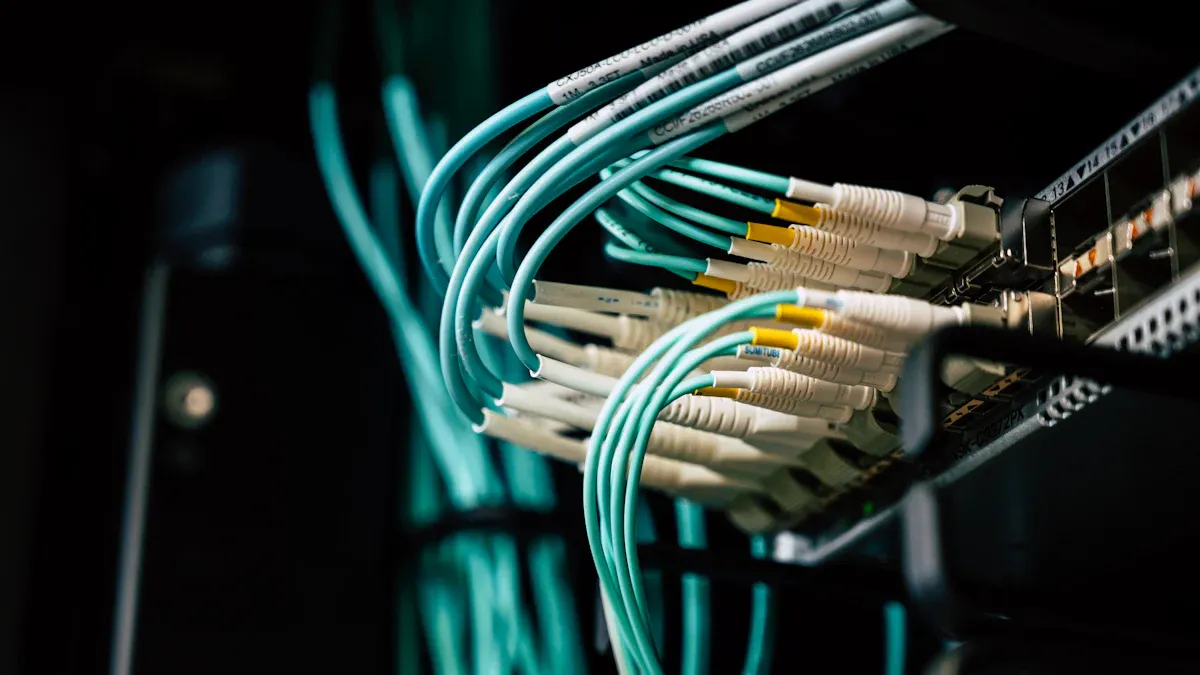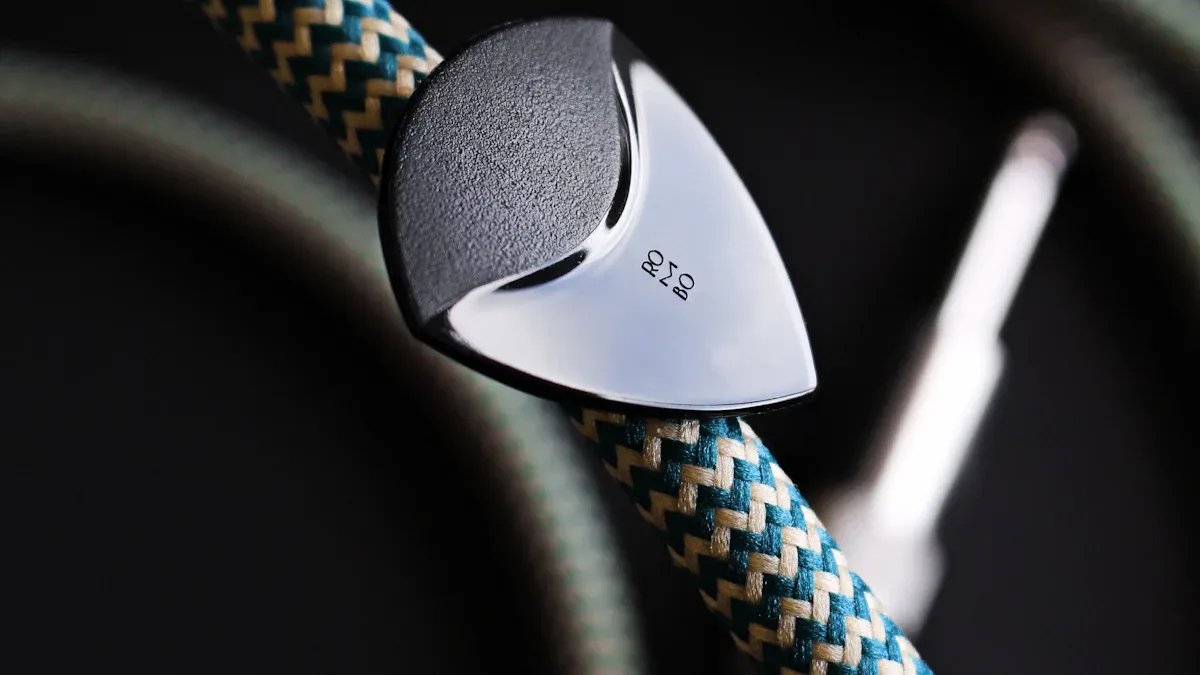Choosing the right custom cable manufacturer is essential for ensuring product reliability and performance. A high-quality custom cable can withstand demanding applications, like hoisting or stationary use, where safety factors range from 3.5 to 12 times the load. Poor-quality cables often fail prematurely. For example, bare cables may last only 400,000 cycles, while nylon-coated cables can extend their lifespan by up to 1000%. These differences impact durability and safety. By focusing on quality, you avoid delays, reduce costs, and improve outcomes for your projects.
Understand Your Needs for High-Quality Custom Cables
Define your cable specifications and requirements
Before selecting a manufacturer, you need to clearly define your cable specifications. Start by identifying the technical requirements of your project. Consider factors like conductor material, insulation type, and shielding needs. For example, a fiber optic cable assembly may require specific conductor characteristics such as flexibility and plating to ensure optimal performance.
Amphenol Custom Cable uses advanced manufacturing technology to meet strict military and commercial requirements. This level of precision ensures that cables perform reliably under demanding conditions.
A well-defined specification also includes labeling. Properly labeled cables, with details like power source and destination, simplify installation and maintenance. They also make it easier to isolate issues during power shutdowns or equipment upgrades.
| Specification Type | Details |
|---|---|
| Conductor Characteristics | Material, plating, flexibility, and gauge are essential for defining the conductor’s performance. |
| Insulation Characteristics | Key factors include temperature rating, UV rating, breakdown voltage rating, and flex rating. |
| Shielding Types | Mylar foil shielding and braided shielding are commonly used to protect against EMI. |
Assess the manufacturer’s expertise in your industry
Not all manufacturers specialize in every industry. You should evaluate their expertise in your specific field. For instance, if you need custom fiber optic cable assemblies for telecommunications, look for a manufacturer with experience in that sector.
Manufacturers like Consolidated and Technical Cable Applications have decades of experience and certifications like ISO 9001:2015, ensuring high-quality standards.
Review their certifications and technical capabilities. Certifications such as IPC/WHMA-A-620 and ITAR compliance demonstrate a commitment to quality and adherence to industry standards. A manufacturer with proven expertise can guide you through the design and production process, ensuring your cables meet performance expectations.
Plan for scalability and future needs
Your cable assembly requirements may grow over time. Choose a manufacturer capable of scaling production to meet future demands. The custom cable market is projected to grow significantly, driven by advancements in technology and increasing demand for tailored solutions.
| Sector | Projected Growth Rate | Key Drivers |
|---|---|---|
| Custom Cable Assemblies | Significant growth expected | Increasing demand for customized solutions across sectors |
| Automotive | CAGR of 8.4% (2021-2028) | Rise of electric vehicles and autonomous technologies |
| Overall Market | USD 27.6 billion by 2025 | Technological advancements and complexity in electronics |
A scalable manufacturer ensures you won’t face delays or quality issues as your needs evolve. They should also offer flexibility in design and production to accommodate changes in your project requirements.
Assess the Manufacturer’s Quality Assurance
Look for certifications like ISO 9001
Certifications like ISO 9001 are a strong indicator of a manufacturer’s commitment to quality assurance. These certifications demonstrate that the company follows internationally recognized standards for consistent production processes and customer satisfaction. For example, many top custom cable manufacturers, such as Connective LLC and Y.C. Cable, hold ISO 9001 or equivalent certifications.
| Manufacturer | ISO Certification(s) |
|---|---|
| Connective LLC | ISO 9001 certified |
| Y.C. Cable | ISO 9001:2015, ISO 13485:2016 |
| Lake Cable | ISO certifications mentioned |
| ABA Cable | ISO certifications mentioned |
When evaluating a manufacturer, ask for proof of their certifications. This ensures that their processes meet high-quality standards and that they can consistently deliver reliable products. Certifications also reflect a company’s ability to adapt to industry-specific requirements, whether you need a fiber optic cable assembly or a more general cable solution.
Evaluate testing and inspection protocols
A high-quality custom cable manufacturer should have rigorous testing and inspection protocols in place. These protocols ensure that every cable assembly meets your specifications and performs reliably under real-world conditions. Testing often includes checks for electrical performance, mechanical durability, and environmental resistance.
A survey of OEM EWIS engineers found that 37% prioritize repeatable quality when selecting wire and cable vendors. This highlights the importance of thorough testing to minimize variability in product performance.
Ask the manufacturer about their testing methods. Do they perform 100% inspection on all products, or do they rely on random sampling? Consistent testing reduces the risk of defects, such as insulation failures or poor conductor quality, which can lead to costly downtime or safety hazards. Manufacturers with robust inspection protocols are more likely to deliver high-quality custom cables that meet your needs.
Investigate material sourcing and durability standards
The materials used in custom cable production play a critical role in determining the durability and performance of the final product. High-quality manufacturers source materials that meet strict durability standards and are suited to your application. For example, special jacketing materials like polyethylene or polyurethane provide superior protection against environmental factors and mechanical stress.
| Material Type | Durability Features | Applications |
|---|---|---|
| Plastic/Rubber | Enhanced strain relief, environmental protection | General use, flexible applications |
| Polyethylene | Superior protection for underwater/underground use | Harsh environmental conditions |
| Polyurethane | Mechanical stress resistance, chemical exposure | Industrial applications |
Custom fiber optic cable assemblies often require tailored materials to handle specific environmental conditions, such as extreme temperatures or exposure to chemicals. Internal reinforcements can also improve mechanical strength, ensuring the cables withstand repeated use without failure. By choosing a manufacturer that prioritizes material quality, you can reduce the risk of operational failures and extend the lifespan of your cables.
Tip: Discuss your application’s unique requirements with the manufacturer to ensure they select the best materials for your cable assembly.
Review the Manufacturer’s Portfolio and Reputation
Examine case studies and past projects
A manufacturer’s portfolio offers valuable insights into their capabilities and expertise. Reviewing case studies and past projects helps you understand how they approach challenges and deliver solutions. Look for examples that align with your industry or application. For instance, if you need a cable assembly for a medical device, check if the manufacturer has experience in producing cables for similar equipment.
Case studies often highlight the manufacturer’s problem-solving skills and ability to meet strict requirements. They may showcase how they designed a high-quality custom cable to withstand extreme conditions or meet specific performance standards. By examining these examples, you can assess whether the manufacturer can handle your project’s complexity and deliver reliable results.
Tip: Ask the manufacturer for detailed case studies that demonstrate their success in projects similar to yours. This will help you gauge their expertise and ensure they can meet your expectations.
Read client testimonials and reviews
Client testimonials and reviews provide firsthand accounts of a manufacturer’s performance. They reveal important details about the manufacturer’s reliability, communication, and product quality. Positive reviews often indicate a strong track record, while negative feedback can highlight potential issues.
Search for reviews on the manufacturer’s website, third-party platforms, and industry forums. Pay attention to comments about the durability of the cables, adherence to timelines, and customer service. For example, a satisfied client might mention how the manufacturer delivered a custom cable assembly that exceeded their expectations in terms of performance and longevity.
Note: Be cautious of overly generic testimonials. Look for specific details that reflect genuine experiences, such as how the manufacturer resolved a challenge or provided exceptional support.
Verify experience in producing high-quality custom cables
Experience plays a crucial role in ensuring a manufacturer can deliver high-quality custom cables. The custom cable assembly manufacturing market has grown significantly, driven by advancements in electronics, automotive technologies, and high-speed data transmission. This growth reflects the extensive experience required to adapt to evolving demands and technological changes.
Manufacturers with years of experience often have a deep understanding of industry standards and best practices. They can anticipate potential challenges and provide innovative solutions. For example, a seasoned wire harness manufacturer will know how to design cables that meet the specific needs of industries like telecommunications or aerospace.
The rising demand for specialized cables, fueled by technologies like 5G and IoT, underscores the importance of choosing a manufacturer with proven expertise. An experienced manufacturer can ensure your cable assembly meets the highest quality standards and performs reliably in your application.
Tip: Verify the manufacturer’s experience by asking about their years in business, industries served, and notable achievements. This will help you determine if they have the expertise to handle your project.
Evaluate Client Involvement in the Process
Assess communication and collaboration practices
Effective communication ensures your project runs smoothly. A high-quality cable assembly manufacturer should prioritize clear and consistent communication. They should provide regular updates and be available to answer your questions. This level of collaboration helps you stay informed and confident throughout the production process.
Look for manufacturers who involve you in key decisions, such as material selection or design adjustments. This collaborative approach ensures the final product aligns with your expectations. For example, a wire harness manufacturer that actively seeks your input can better tailor the cable assembly to your specific needs.
Tip: Choose a manufacturer that assigns a dedicated point of contact. This simplifies communication and ensures you always know who to reach out to for updates or concerns.
Look for transparency in timelines and updates
Transparency in timelines is crucial for planning your project effectively. A reliable manufacturer will provide a clear production schedule and stick to it. They should also inform you of any potential delays and explain how they plan to address them.
Ask the manufacturer about their process for providing updates. Do they offer regular progress reports? Are they proactive in notifying you about changes? Transparent communication builds trust and reduces the risk of unexpected surprises. For instance, a fiber optic cable assembly project often involves complex steps. Regular updates ensure you stay informed about each stage of production.
Note: Manufacturers who value transparency are more likely to deliver on time and meet your quality expectations.
Ensure flexibility and customization options
Flexibility is essential when working on custom cable projects. A manufacturer that offers customization options can better meet your unique requirements. Custom cables are tailored to specific applications, improving performance and reliability. They also reduce maintenance costs and enhance productivity.
Custom cable solutions are critical for meeting specific application demands, enhancing productivity, and reducing risk, which directly contributes to client satisfaction.
Manufacturers that prioritize flexibility can adapt to changes in your project. For example, they might adjust the design to accommodate new specifications or scale production to meet increased demand. This adaptability ensures your cable assembly performs optimally in its intended application.
- Custom cables are tailored to unique project needs.
- They improve performance and reliability.
- They help reduce maintenance costs and boost innovation.
- Custom cable assemblies provide unparalleled flexibility and adaptability.
- They can be engineered to fit specific application requirements.
- This precision ensures optimal performance and reliability.
By choosing a manufacturer that values customization, you can achieve a solution that perfectly aligns with your goals.
Consider the Manufacturer’s Location and Logistics
Evaluate proximity for shipping and logistics
The location of a custom cable manufacturer directly impacts shipping efficiency. Manufacturers closer to your end market can reduce transportation costs and lead times. This proximity ensures faster delivery, which is crucial for meeting tight deadlines. For example, reshoring manufacturing has shortened supply chains, allowing quicker access to essential components. This approach benefits industries like EV charging stations, where timely delivery of custom cable assemblies is critical.
Geographic factors such as access to transportation modes and infrastructure quality also influence shipping efficiency. A manufacturer located near major highways, ports, or airports can streamline logistics and minimize delays.
When evaluating a manufacturer, consider their distance from your facility or project site. Shorter distances often mean fewer logistical challenges and lower costs.
Consider time zones and ease of communication
Time zones play a significant role in maintaining smooth communication with your manufacturer. Working with a manufacturer in a similar or overlapping time zone allows for real-time updates and quicker responses to inquiries. This is especially important for projects requiring frequent collaboration or urgent adjustments.
Tip: Choose a manufacturer that offers flexible communication options, such as video calls or dedicated account managers. This ensures you stay informed and can address issues promptly, regardless of time differences.
Manufacturers in distant time zones may face delays in responding to your concerns. This can slow down decision-making and affect project timelines. Prioritize ease of communication to avoid unnecessary disruptions.
Assess the impact of location on costs and delivery times
The geographic positioning of a manufacturer affects both costs and delivery times. Being closer to your location reduces fuel expenses, vehicle maintenance costs, and overall transportation fees. It also shortens lead times, helping you meet customer demands more efficiently.
- Manufacturers near end markets can:
- Lower shipping costs.
- Enhance delivery speed.
- Improve overall supply chain efficiency.
For instance, the reshoring index rose to 39 in 2022, reflecting a shift toward domestic production. This trend highlights the benefits of working with manufacturers closer to home. By choosing a nearby manufacturer, you can save money and ensure timely delivery of high-quality custom cables.
Identifying a high-quality custom cable manufacturer involves focusing on several key factors. You should prioritize material selection to ensure cables meet your specific requirements and perform efficiently. Manufacturers with proper certifications, like ISO or UL, guarantee safety and quality by adhering to industry standards.
- Cables designed, prototyped, and approved before production prevent performance issues.
- Customer involvement in design phases ensures the final product aligns with your needs.
- Proximity and time zone alignment improve communication and speed up delivery.
By aligning the manufacturer’s capabilities with your project goals, you can avoid delays and ensure reliable outcomes. Conduct thorough research to make informed decisions that benefit your operations.
FAQ
What certifications should a high-quality custom cable manufacturer have?
Look for certifications like ISO 9001, IPC/WHMA-A-620, and UL. These ensure the manufacturer follows strict quality standards and industry regulations. Certifications demonstrate their commitment to delivering reliable and safe products.
How can I verify a manufacturer’s experience in my industry?
Review their portfolio, case studies, and client testimonials. Ask about their past projects in your industry. Experienced manufacturers often highlight their expertise in specific sectors, such as telecommunications or automotive.
Why is material sourcing important for custom cables?
Materials determine the durability and performance of cables. High-quality manufacturers use materials like polyethylene or polyurethane for specific applications. Discuss your needs with the manufacturer to ensure they select the best materials for your project.
How do I ensure the manufacturer meets my timeline?
Choose a manufacturer with transparent communication and clear timelines. Ask for regular updates on production progress. Manufacturers with a proven track record of on-time delivery are more likely to meet your deadlines.
What role does location play in choosing a manufacturer?
Proximity reduces shipping costs and delivery times. It also simplifies communication. Working with a nearby manufacturer ensures faster responses and fewer logistical challenges, especially for time-sensitive projects.



